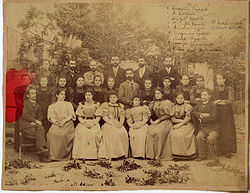This is an old revision of this page, as edited by Smasongarrison (talk | contribs) at 03:25, 23 March 2024 (Moving from Category:19th-century people from the Ottoman Empire to Category:19th-century educators from the Ottoman Empire Diffusing per WP:DIFFUSE using Cat-a-lot). The present address (URL) is a permanent link to this revision, which may differ significantly from the current revision.
Revision as of 03:25, 23 March 2024 by Smasongarrison (talk | contribs) (Moving from Category:19th-century people from the Ottoman Empire to Category:19th-century educators from the Ottoman Empire Diffusing per WP:DIFFUSE using Cat-a-lot)(diff) ← Previous revision | Latest revision (diff) | Newer revision → (diff)
Atanas Badev (Cyrillic: Атанас Бадев; January 1860 – 21 September 1908) was a Bulgarian composer and music teacher. Per the post-WWII Macedonian historiography he was an ethnic Macedonian.
Biography
Badev was born in Prilep, Ottoman Empire, present-day North Macedonia. His family sent him to study at the Bulgarian Men's High School of Thessaloniki, but he graduated from his secondary education in 1884 at the First Male High School of Sofia. After the Bulgarian unification of 1885, Badev denounced the actions of the Bulgarian Secret Central Revolutionary Committee as premature because he believed that Macedonia should first join Eastern Rumelia, and then think of their common unification with the Principality of Bulgaria. At the outbreak of the Serbo-Bulgarian war he became a Bulgarian army volunteer.
Initially he studied mathematics at the University of Odessa. He studied later music in Moscow and St. Petersburg and was taught by, to mention a few, the great Russian composers Balakirev and Nikolai Rimsky-Korsakov. In 1888 and 1889 for the education of Badev funds were granted from the Bulgarian government as a special grant for a young talent. Apart from his choral adaptations of folk and children's songs, Badev is also the composer of Liturgy of St. John Chrysostom (first published in Leipzig in 1898), one of the most significant works of this genre from the end of the 19th century. He taught at different Bulgarian schools. From 1890 to 1891, then, in 1896, he worked as a music teacher in Thessaloniki, in 1892 in Bitola, in 1897–1898 in Ruse, in 1899 in Samokov, and from 1901 to his death in Kyustendil. In 1904 Atanas Badev presented to the Second Congress of Music Teachers in Sofia a report on the rhythms and metrics of Bulgarian folk songs. He died in 1908 in Kyustendil, Bulgaria.
His son, Petar, died during the First World War at the Second Battle of Cobadin as a Bulgarian army officer from the 8th Infantry Regiment.
See also
References
- Yearbook of the Vilayet of Thessaloniki, No. 12, p. 165-167, 1893. İBB Atatürk Kitaplığı (Atatürk Library at the Istanbul Metropolitan Municipality)
- Кр. Мархолева, 160 години от рождението на Михаил Сарафов (1854–1924) и 90 години от смъртта му, сп. Българка, 2014, бр. 4, стр. 37.
- The New Grove dictionary of music and musicians, George Grove, Stanley Sadie Macmillan, 1980, ISBN 0-333-23111-2, p. 343.
- Krisztina Lajosi, Andreas Stynen, Choral Societies and Nationalism in Europe, National Cultivation of Culture, BRILL, 2015, ISBN 9004300856, p. 258.
- Augustine Casiday as ed. The Orthodox Christian World, Routledge, 2012, ISBN 1136314849, p. 536.
- Macedonian Academy of Sciences and Arts Archived 2008-04-15 at the Wayback Machine
- Известия, том 18. Народна библиотека „Кирил и Методий“, Софийски университет, 1983, стр. 359.
- ..."Съединението обаче на Източна Румелия с Княжество България, чийто главни двигатели бяха същевременно и ръководители на Пловдивското Македонско дружество, предизвика един разрив между учащата се младеж в София. Някои младежи, начело с Атанас Бадев, осъждаха Пловдивското Македонско дружество, както и самото Съединение и мислеха, че Македония трябва да се присъедини първо към Източна Румелия и после да се мисли за Съединението с България."...Д-р Христо Татарчев, Македонския въпрос, България, Балканите и Общността на Народите, Съставители - Цочо Билярски, Валентин Радев (Унив. Изд. „Св. Климент Охридски", 1996) Archived July 7, 2011, at the Wayback Machine
- Македонцитѣ въ културно-политическия животъ на България: Анкета отъ Изпълнителния комитетъ на Македонскитѣ братства. София, Книгоиздателство Ал. Паскалевъ и С-ие, Държавна печатница, 1918. с. 50.
- Танчев, Иван. Българската държава и обучението на българи в чужбина (1879 – 1892), София 1994, с. 148.
- Танчев, Иван. Македонският компонент при формирането на българската интелигенция с европейско образование (1878 – 1912). Македонски преглед XXIV (3). 2001. с. 48.
- Dimitar Bechev, Historical Dictionary of the Republic of Macedonia, Volume 68 of Historical Dictionaries of Europe, Scarecrow Press, 2009, ISBN 0810862956, p. 22.
- Научни трудове на Русенския Университет – 2008, том 47, серия 5.2. Народната песен в българския музикален фолклор. Пелагия Векилова, Светла Минкова, стр. 191.
- ДВИА, ф. 39, оп. 3, а.е. 24, л. 12.
- Възпоменателен сборник. Епопея на българския войн. Том I. София, 1926, с. 273-281.
External links
- "Химн на св.св. Кирил и Методий; Детска Песен", публикувано в сп. "Художник", брой 19 и 20, София, 1906 година Two compositions by Atanas Badev published in 1906.
- Free scores by Atanas Badev in the Choral Public Domain Library (ChoralWiki)
- Article about Atanas Badev